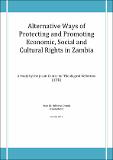| dc.contributor.author | Ndhlovu, Hope | |
| dc.date.accessioned | 2020-04-29T07:21:13Z | |
| dc.date.available | 2020-04-29T07:21:13Z | |
| dc.date.issued | 2011-01 | |
| dc.identifier.citation | Ndhlovu, H. (2011). Alternative ways of protecting and promoting Economic, Social and Cultural Rights In Zambia. Lusaka, Zambia: Jesuit Centre for Theological Reflection (JCTR). | en |
| dc.identifier.uri | https://repository.jctr.org.zm/handle/20.500.14274/67 | |
| dc.description | The Universal Declaration of Human Rights of 1948; the International Covenant on Civil and Political Rights and the International Covenant on Economic Social and Cultural Rights, both of 1966; the Vienna Declaration and Programme of Action, adopted at the World Conference on Human Rights in June 1993; and the United Nations Declaration on the Right to Development of 1986, all affirm the indivisible and interdependent nature of all human rights. Sadly, despite Zambia’s subscription to the provisions of these treaties and declarations, the State’s protection and enforcement of economic, social and cultural rights is still a far cry. Much controversy, resistance and debate still surrounds the importance of these rights and the need for their enforcement.
The Faith and Justice Programme of the Jesuit Centre for Theological Reflection (JCTR), in continuing with its work in the area of research and advocacy for the promotion and protection of economic, social and cultural rights (ESCR), decided to undertake this study and explore alternative ways of promoting and protecting economic, social and cultural rights.
This report discusses what human rights, and in particular economic, social and cultural rights are, and the state of their enjoyment and enforcement in Zambia. The report looks at some interventions that Zambia has made to promote these rights. It will also examine the methods applied in other countries and the recommendations made towards their fulfilment. The report establishes that there is an irrefutable interconnection and interdependence between economic, social and cultural rights and civil and political rights. It concludes with recommendations on how Zambia can better protect and promote the economic, social and cultural rights of its people. | en |
| dc.description.abstract | Considering Zambia’s history in the area of constitution making, particularly with regard to amendments to the Bill of Rights and the adoption of stronger measures to protect rights, including economic, social and cultural rights, and owing to the realisation that economic social and cultural rights cannot be promoted by mere inclusion in the Bill of Rights, JCTR decided to undertake this study and explore alternative ways of promoting and protecting economic, social and cultural rights. Many countries in the world do not have economic, social and cultural rights enshrined in their Bills of Rights yet they remain committed to promoting them | en |
| dc.language.iso | en | en |
| dc.publisher | Jesuit Centre for Theological Reflection | en |
| dc.rights | Attribution-NonCommercial-ShareAlike 3.0 United States | * |
| dc.rights.uri | http://creativecommons.org/licenses/by-nc-sa/3.0/us/ | * |
| dc.subject | ESCR | en |
| dc.title | Alternative Ways of Protecting and Promoting Economic, Social and Cultural Rights in Zambia | en |
| dc.type | Research Paper | en |

